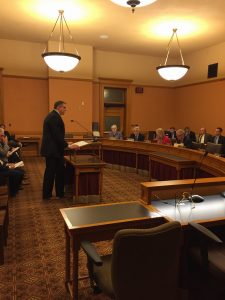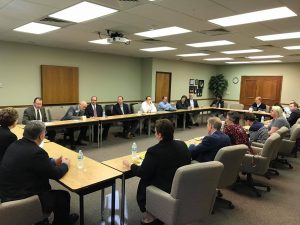Nobody said it was going to be pretty. Last week, the Senate debated, dismembered and killed the governor’s tax plan. In the process, they sent their clearest message yet that they intend to pass lasting tax and budget reforms. The governor’s plan, it will be recalled, entailed a $1 per pack cigarette tax hike, doubling the tax on liquor, taxing passive income including rents and royalties, increasing the annual reporting fee for nonprofits and LLCs and freezing the bottom income tax rate at 2.7% (it was scheduled to drop to 2.6% this year). The plan would have raised about $180 million in the fiscal year, which starts on July 1, 2017, and $198 million the year after.
It is not going to happen that way. The Senate Tax committee will be hearing this week about a new tax bill which would raise closer to $578 million next year. Also, this week Senate President Susan Wagle will be meeting with a small group of Chamber members to hear their thoughts on the best way to reform taxes without causing undue disruption to small business.
The Senate and the governor remain at odds over how to cobble together enough cash to close out the current fiscal year which ends on June 30. The House has approved the governor’s short-term plan, which involves tapping into a myriad of unused funds scattered across state government. (Despite the name, these “unused funds” are not just happy pockets of money waiting to be found and spent. These are fees and taxes which have been collected and invested for safe keeping but haven’t been expended yet. The governor essentially proposes taking a mortgage out on those funds.) Senate leadership is pressing for cuts in spending, too, as a way of getting to the end of the year; however, the recent school finance ruling makes any talk of cuts to education extremely touchy.
PEAK Hearing
 The Senate Committee on Assessment and Taxation held hearings last week on two bills which would eliminate or seriously lessen the usefulness of the state’s jobs incentive program called PEAK. PEAK, which stands for Promoting Employment Across Kansas, gives employers a withholdings tax rebate when they create at least 10 new jobs which pay more than the county median wage. The bills heard last week would either shut the PEAK program off for a year or limit it to companies which relocate to Kansas from at least 250 miles away; thus, cutting existing Kansas companies off from the incentives.
The Senate Committee on Assessment and Taxation held hearings last week on two bills which would eliminate or seriously lessen the usefulness of the state’s jobs incentive program called PEAK. PEAK, which stands for Promoting Employment Across Kansas, gives employers a withholdings tax rebate when they create at least 10 new jobs which pay more than the county median wage. The bills heard last week would either shut the PEAK program off for a year or limit it to companies which relocate to Kansas from at least 250 miles away; thus, cutting existing Kansas companies off from the incentives.
The Topeka Chamber, along with numerous other local chambers and the state chamber of commerce, testified that the PEAK program is a key tool used by economic developers, like Go Topeka, to attract businesses to Kansas and encourage existing ones to expand. As Matt Pivarnik testified, “A number of Topeka’s fastest-growing employers have taken advantage of these incentives. In most cases, these were companies which could have chosen to locate elsewhere.” Eliminating the program could send the message that Kansas is no longer serious about competing for jobs. The committee took no action on the bills.
School Finance
Legislative leaders spent most of last week considering offline how to respond to the supreme court’s school finance ruling. The court ruled the week prior that the state is failing to fulfill its constitutional obligation to provide an adequate level of funding for public education. Some estimate the cost of fully complying with the ruling could exceed $500 million but the court did not set forth a particular dollar amount. Rather, the ruling notes that as many as 25% of Kansas pupils are not meeting math and reading standards so their education must be inadequate. The block grant system currently being used to fund schools is clearly not getting the job done. As they develop a new school finance formula, legislators may devise a strategy for targeting those at-risk students. The cost of that would not necessarily be as high as simply raising the base amount the state pays for each student.
The House K-12 Education Budget Committee has been meeting since the start of the session to devise a better school funding formula. Last week, Sen. Wagle appointed a Senate Select Committee on Education Finance to undertake the same task. It is believed she wanted to tackle the budget and taxes before taking on the school finance issue. However, since the court gave the legislature until June 30 to comply with its ruling, the Senate will apparently need to multi-task.
Transportation
Both the Senate and the House are considering ways to restore funding to the state’s highway program, called T-WORKS. In recent years, the governor and legislature have repeatedly “swept” funds out of the program to pay other state bills. The Senate will consider a rise in the gas tax from $.24 to $.29. That would raise about $100 million each year. The House is looking at an 11 cent increase which would raise about $200 million annually. The idea would be that these new tax monies would be dedicated to the highway fund. In addition, last week the House Appropriations Committee gave the OK for KDOT to issue up to $400 million in bonds to raise cash for needed highway preservation projects.
Other Legislative Activities
The Chamber is closely watching legislation to:
- Expand Medicaid – passed the House, faces a tougher road in the Senate
- Streamline the process whereby cities can reclaim long-abandoned houses and put them into the hands of neighbors who will restore them – on the floor of the Senate
- Empower cities to designate certain areas where adults could carry alcoholic beverages on the sidewalk – being worked in a House committee
 The Chamber’s final 2017 installment of Pie and Politics was a big success. Over 25 Chamber members attended to hear from freshman Representatives Brenda Dietrich and Virgil Weigel. Their description of a solid bi-partisan block of freshmen which has been meeting weekly to develop pragmatic solutions to the serious problems facing the state was very hopeful.
The Chamber’s final 2017 installment of Pie and Politics was a big success. Over 25 Chamber members attended to hear from freshman Representatives Brenda Dietrich and Virgil Weigel. Their description of a solid bi-partisan block of freshmen which has been meeting weekly to develop pragmatic solutions to the serious problems facing the state was very hopeful.
Don’t miss the Legislative Coffee at 9:00 a.m. on Saturday, April 8 at the public Library. The forum is co-sponsored by the Chamber, the Topeka & Shawnee County Public Library, the League of Women Voters, Heartland Visioning and Forge. This will be a great opportunity for members of the public to hear directly from their legislative delegation about the important issues being debated at the Statehouse.
